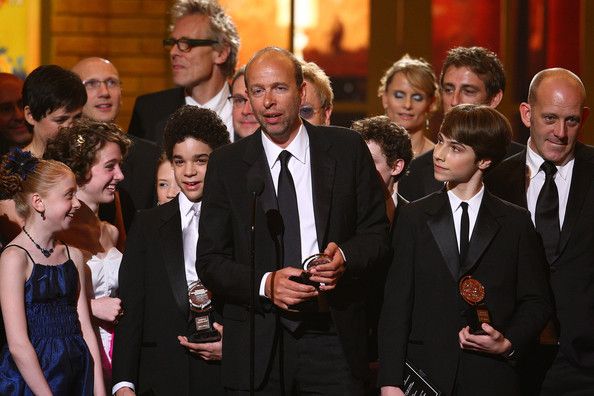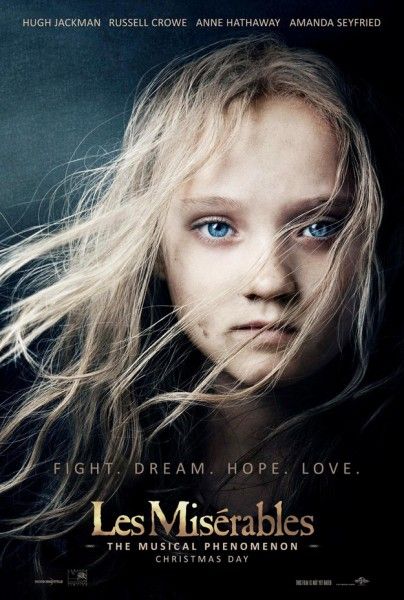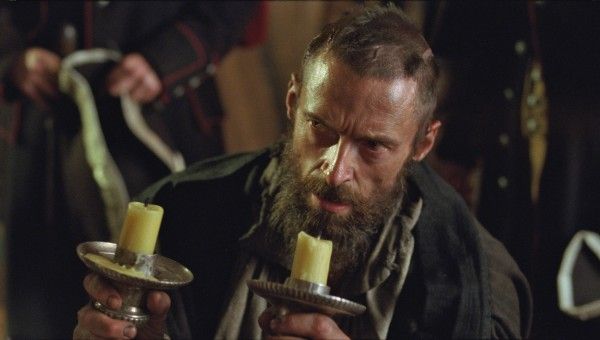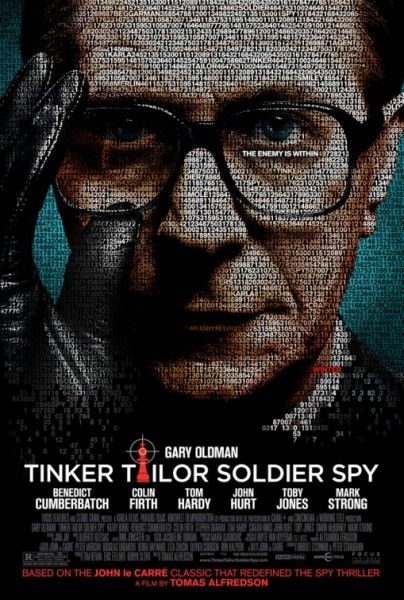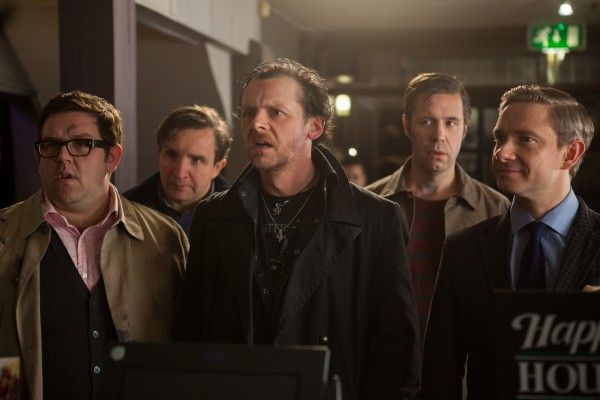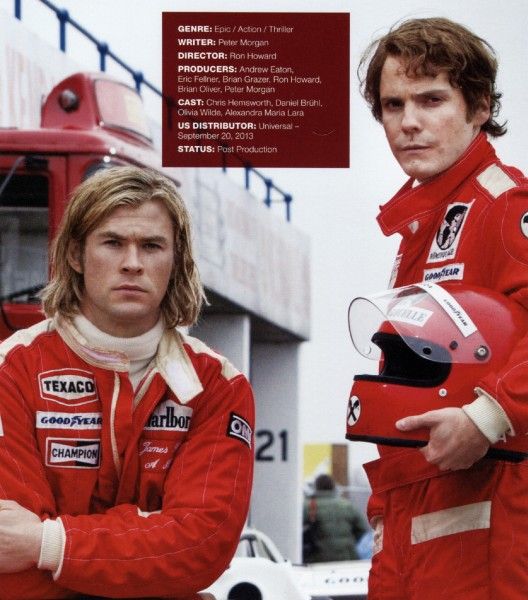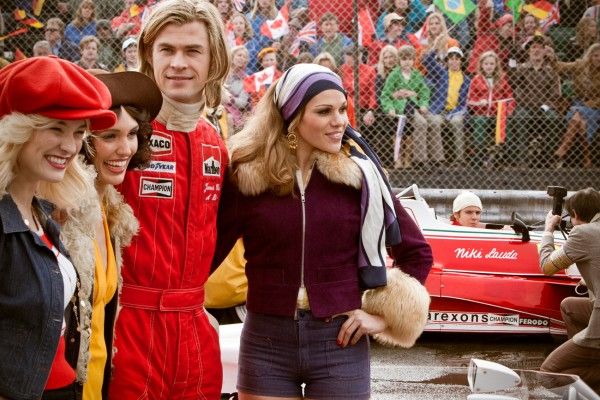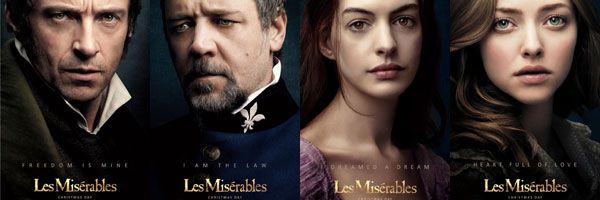Now playing is director Tom Hooper’s fantastic adaptation of Les Miserables. Loaded with great performances and top notch filmmaking, Les Mis is absolutely a contender for all the year end awards and it would shock me if Anne Hathaway doesn’t win the Best Supporting Actress Oscar for her incredible work as Fantine. Her one take rendition of “I Dreamed a Dream†was incredible and it’s the type of performance that’s unforgettable. For more on the film, here are five clips, Matt's review, and all our previous coverage.At the recent NYC press day for the film I did an exclusive interview with producer Eric Fellner (who runs Working Title with Tim Bevan). Since Sid and Nacy in 1986, Fellner has produced 100 movies and he shows no signs of slowing down. During the interview we talked about how Les Mis came together, the way the industry has changed over the past decade, whether VOD and online streaming become a real revenue stream, if we could eventually get an extended cut of Les Mis (the first assembly cut was four hours!), and more. In addition, with Fellner producing so many other projects, I got updates on the Tinker Tailor Soldier Spy sequel, Edgar Wright's The World's End, Ron Howard's Rush, Richard Curtis' About Time, Everest and more. Hit the jump to either listen to the audio or read the transcript.As usual, I'm offering two ways to get the interview: you can either click here for the audio or the full transcript is below.Finally, for fans of the film, you might like to learn that Fellner revealed the first cut of Les Mis was four hours. So I asked him if the film is a huge hit in theaters is there the possibility of doing a re-release extended cut? He said:
"There’s always that possibility. But, it would take a hell of a lot of work. Because unlike a movie where you just have to do a little ADR and then some mixing, we’ve actually got to bring the orchestra back because there is music, as you probably noticed, right the way through the film so you have to orchestrate all of that extra time. It wasn’t like we cut songs out; we cut bits of songs, bits of action or bits of whatever. So we would have to go back in get a full orchestra re-orchestrate it, re-score it, re-record it. It’s a massive job. But, if there’s a demand we can always discuss it."
Here's the full interview:
Collider: Mr. Edgar Wright wants to know who is your favorite Wright: Joe or Edgar?
Eric Fellner: Edgar.
Are you sure?
Fellner: Yes. Have you been in touch with him today?
Yes.
Fellner: Tell him that I love all my Wrights and it would be impossible to say which one I love more, but if you really pushed me, it would be Joe.
Simon Pegg said, “Ask him who he likes best, Hugh Grant or me?â€
Fellner: Definitely Simon Pegg.
Are these just the answers you’re giving because...
Fellner: No, no, no; I always tell the truth. You haven’t got one from Nick [Frost]?
No, I didn’t. I’m sorry.
Fellner: That’s alright. You can ask them a question: are they working?
I would imagine they are because it took them a while to get back to me.
Fellner: What time is it? Six o’clock. Night shoots, yeah, they’ll be on set now.
Exactly. So let’s jump into why I’m actually getting to talk to you today. You’ve produced over a hundred movies.
Fellner: You know, it’s weird with numbers, we can’t work out how many it is, but between us we think it’s around 96, 97.Â
I’m using the always accurate IMDB.
Fellner: Oh, IMDB, yeah; there’s a few things on there that are TV, they’re not film, some things they think we did that we didn’t. There’s a few inaccuracies in there. It’s terrifying though, isn’t it?
It is. I was admiring your resume this morning noticing that you started with Sid and Nancy, talk about starting with a bang and you’ve been going since then. How has the industry changed for you over the years that you’ve been doing this? Is there something that you’ve really noticed or is it like every few years there is a shift?
Fellner: The shifts happen on a regular basis, but it’s like a cycle. So things come in and out of vogue and then five years later they’re back in vogue. Or there seems to be a theory that this is the way the industry will go and everybody goes over that way and then something happens to the country and you’re back again at the place you were. So, to me, it does shift, but it goes round. It just keeps going round and round and round. So if you have the longevity you have the belief and you have the resources to just keep at it you just ignore all that and just keep going where you’re at.
Right now there is a real seismic shift though and that is that the industry is actually physically changing. Before it was all about taste and the tastes were the things that went round and round. Something like small English films were in vogue you had something like The Crying Game and everyone piled into London and wanted to make small English movies. Then something fails and they’re all out again, but DVD revenue is disappearing, you know, it’s not disappearing but it’s going off a cliff and what that’s done is it's polarized the industry in a way that I’ve never seen before where studios are making less, they’re bifurcating their choices where they’re either going very, very big or they’re just picking up a few rights on an acquisition basis or making really small things. That middle ground of films used to be 70, 80, 90, 100; now it’s like anything over 20 or under 140, the middle ground has become this huge area where they don’t really want to be. Now there’s always exceptions to that and the reason is if the film doesn’t really work, whereas before you could rely on a decent amount of DVD sales to prop up the revenue to ensure that you got out in a decent manner, now if the film doesn’t work, the film doesn’t work and there’s none of that DVD revenue to fall back on and you can lose a huge, huge sum of money on a big budget movie. So that is new in terms of where I’ve seen the shifts. Otherwise, it’s all about taste and taste just keeps going round and round and round.Â
For us in England the relative value of the pound against the dollar, that has a huge impact on how easy it is to get our films made in the UK. When the dollar is 2:1 it’s very hard, when its 1.50 it’s much easier, so at the moments it’s around 1.55, 1.60 so it’s good. People are piling into England, there’s lots of studio films happening there. When we budget our films we multiply it by 1.55 it’s much easier than when we multiply it by 2 so the cost looks a lot less in dollars, because everybody talks in dollars in terms of finance. And then the shift that I think is coming, I hope is coming, is movies made in a..."simple" is the wrong word, you visit movie sets all the time I imagine, the whole process has just got so big.
Although I will tell you I’ve been on some movie sets where it feels way more intimate than I ever expected from mega-budget, then I’ve been on sets where there’s like 100 people standing around.
Fellner: But in the former, those movie sets that you’ve been on like that, even if they’re huge movies and most of its being spent in special effects afterwards, I think that’s the way that we're going. And I think everyone’s going to really try to keep costs down. The more you keep costs down, the more freedom you have creatively. I can protect my filmmakers from any form of creative interference, be it from anywhere, if we’re all acting in a responsible way and making the pain of a failure be as little as possible.Â
I hear this from every filmmaker; it’s a question of budget versus creative freedom.
Fellner: Yeah.
Looking at video on demand, not just iTunes, in this year I’ve used iTunes more and more to get movies, to rent movies. I’ve used Amazon, have you seen money coming in through VOD?
Fellner: Yeah, but it’s taking off. Whereas the DVD revenue is going off, this one’s coming up. They’re not matching each other yet, but they will. My theory is, I don’t know how long it’s going to be five or ten years, there will be only two ways to see a movie and that will either be on your computer through your TV screen or in the cinema, end of story. There will be no DVD, that’s it, simple. The pay window will be: you can choose how and when you see, whether you see it on Comcast or Warner’s Cable delivery system or Sky in the UK or you can buy it through Apple, or you might even buy it directly from the studio’s site. Who knows? But that will be it. You’ll go to the cinema and you’ll find a way of digitally interacting with the piece; you’ll either buy it or rent it or whatever.Â
Getting into Les Miserables for a second, how long have you been with this project trying to get this thing going?
Fellner: I met with Cameron [Mackintosh] in 2009 and the guy that runs this company in England, a chap called Mick Allen is a very, very good friend of mine and he just said to me, “You know, I think Cameron...it was 24 years ago when he last tried to make this as a movie, Allan Parker was going to direct it at Columbia. I think he might be ready to have the conversation again. So if you’re interested why don’t you see if you can persuade him?†So I went to his office and started to persuade him and we got on well, we created a partnership and we decided to do it. It was complicated because I knew the way in which a film gets made the filmmaker would need a certain amount of control, and I also knew that from Cameron’s point of view that him, Claude-Michele [Schonberg], and Alain [Boublil] who have spent thirty years creating this masterpiece, this theatrical masterpiece, of course they should have some control. So it was complicated working out how we would make the rub work. Ultimately, it worked beautifully. Everybody got on famously. There was a lot of trust in the process and Claude-Michele, Alain, and Cameron brought the detail, magic and knowledge of the music world and we brought the detail, knowledge and magic of the film world, and Tom was right in the middle trying to do all of it and we’ve all ended up friends. For me, I can’t tell you if the film is good or bad, all I can say is for me the film is way better than I had expectation of us being able to make. So for me that’s the most important thing. Have we exceeded our dream in terms of what it could be? And I think we have. The dream was to not only make a good-looking film that engaged, but also had the DNA of the show so the fans would love it and also as important had the opportunity to cross over out of the fans because of the price-point. You make a film that’s 60 million dollars you can’t just appeal to musical theater fans.
I will tell you as an outsider, it looks a lot better than 60 million. It looks real good on the screen.
Fellner: Good, good.Â
The movie’s real fucking good. Sorry for cursing.
Fellner: Good, do you come at is as a fan of the show?
Not at all.Â
Fellner: Yeah, see, you’re who I’m really excited to get to.Â
It’s quite good.
Fellner: You know, when we say quite good, it means its O.K.
No when I say quite good-
Fellner: You mean very good.
I would see it again, that's my definition. My biggest thing is when I get out of the movie do I want to tell somebody they have to go see it?  That’s it, right there. Because if you don’t want to tell anyone that they want to see this movie, you’re fucked.
Fellner: You’re fucked, yeah.
Because on Friday night on Facebook and Twitter when people aren’t recommending it, you’re dead on Saturday. I’m putting myself into this interview and I don’t want to; it’s quite good. The movies about 2:30; how long was your first cut on this thing?
Fellner: About four and a bit.
[Laughs] Now the big question is if this is a huge hit in theaters is there the possibility of doing a re-release extended cut?
Fellner: There’s always that possibility. But, it would take a hell of a lot of work. Because unlike a movie where you just have to do a little ADR and then some mixing, we’ve actually got to bring the orchestra back because there is music, as you probably noticed, right the way through the film so you have to orchestrate all of that extra time. It wasn’t like we cut songs out; we cut bits of songs, bits of action or bits of whatever. So we would have to go back in get a full orchestra re-orchestrate it, re-score it, re-record it. It’s a massive job. But, if there’s a demand we can always discuss it.
Is there the possibility of doing an extended cut on the Blu-ray down the road? Are there deleted scenes that came out at the last second that you had scored?
Fellner: No, we only scored the very finished film. For one thing Tom did an amazing thing. We screened the film at 2:46 or 2:47 to the studio and then to a little bit of a wider audience, but not that much wider, and it went down incredibly well and everyone really, really liked it. We said, “It would be great if it was shorter, how could we try and make it shorter? But it works pretty well as is.†Tom, to his credit, and I’ve worked with many, many directors and they would have just gone locked; he came back to London and said “Ok, let’s go.†And he cut seventeen minutes out of it in a matter of two weeks and I watched the film and I could hardly see the cuts. It was incredible what he did. It was literally him and his editor and they just kind of shaved it, shaved it, shaved it and the film suddenly had a...because you would notice, it motors, the film. It literally just sprints from one scene to the next. I think for a musical you’ve got to do that, because otherwise people who aren’t used to musicals could find themselves getting bored or whatever. So he cut it down, and I think it’s good at that length. So the answer ultimately is no, we never orchestrated that longer version. But we could, we might do. There’s one song that Sacha [Baron Cohen] sang in the sewers that’s not in the movie, that’s the only song. That would be very doable to put that back.
I know I’m running out of time so I want to jump into a few things real fast. Is there any  possibility of a Tinker Tailor Soldier Spy sequel?
Fellner: We’re working on...Tim [Bevan's] writing it and I can’t remember.Â
Oh, I can’t remember the name of the next book.
Fellner: I will get it for you, but we’re working on another one. Tim is putting together as we speak with Peter Straughan and Tomas Alfredson. So yes, it’s in development.
It did like 80 million worldwide.
Fellner: Yeah, it did unbelievably well and it didn’t cost hardly anything.
Well, that’s what I was going to say and I know, Gary Oldman, because I talked to him about it, he loved playing the character; loved. So I’m assuming he’s still very excited to play the character again. Is this a priority for you guys?
Fellner: Yeah, but things take time.
No, totally. I really enjoyed that movie and I think that the more you see it the more you get out of it so I’m glad to hear that you guys are working on it.
Fellner: No, Tim is passionate about making sure that we do another one.
You recently worked with Richard Curtis on About Time.
Fellner: About Time, Yeah.
I spoke to someone who was in it recently. When someone’s made Love Actually, which is on TV all the time, does that get you a lot more creative freedom because everybody loves that movie?
 Fellner: Yeah, I mean Richard’s unique. He’s made…
Just a few.
Fellner: Just a few. He’s never written a script that hasn’t been made. His films have done billions of dollars and he’s only had one film that wasn’t a success, which is a shame because I really liked it, The Boat that Rocked. But again it’s not an expensive film, it’s a small film. It’s a romantic comedy about two people meeting and falling in love and having a family and that’s it. Has a bit of time travel in it, but who doesn’t? And it’s a beautiful thing. We screened it two nights ago in Los Angeles and the preview was...the numbers were amazing. People absolutely adored it.
Richard seems to have a touch, he gets it with people. He has that thing. You’ve worked with Edgar, Nick and Simon.
Fellner: Love Edgar, Nick, and Simon.Â
As do I and as do all my readers. Incredibly excited about what they’re filming right now. What can you tease people about how it’s going? What can you tell?
Fellner: Well I can tell them that they’re all very wet and very cold because they’re doing four weeks of night shoots and the weather's brutal. So I bought Edgar a furry hat to try and keep him warm. They’re just digging in and doing it. The work is fantastic; very, very funny. There’s these great scenes with Nick with these barstools, he’s beating the shit out of people; Simon, very funny. Great cast with them: Rosamund Pike, Paddy Considine, Eddie Marsan and Martin Freeman. Martin was slightly shocked apparently the other day; I just heard this second hand. He had to go to New Zealand for the premiere of The Hobbit. Nira [Park], the British producing partner with Edgar was telling me that he called because he got to the airport and apparently his face is painted on all of the Air New Zealand planes. So he got there and saw this plane and his face was painted on the outside of it. So I think he’s slightly shocked at the moment. But it’s going brilliantly, and it's going to be funny and Edgar’s on very good form.
I imagine with them and the success they’ve had on other films, I imagine it was not hard to get people to be a part of it.
Fellner: Yeah, yeah, yeah. No, In terms of putting the cast together, no problems. You know, the only problem always is just price-point. Our ambitions as we get older, all of us, is to try and do more. The problem with Hot Fuzz and Shaun of the Dead is that they worked brilliantly in the UK, the US, and Australia; internationally they haven’t worked so well because people don’t know the films as well as in the English speaking languages. So when it comes to putting the budgets together it’s quite challenging. So those are the problems you have.
Before I run out of time, what’s the status of the Bridget Jones’s Baby movie?
Fellner: Can I take the fifth on that?
Yes. How is The History Keepers.
Fellner: Development.
Have you seen a rough cut of Rush?
Fellner: I’ve seen more than a rough cut; I’ve seen a nearly finished film. It’s great. Daniel Bruhl...
That’s what we keep hearing. Michael Moses from Universal keeps on raving about him.
Fellner:  [Chris] Hemsworth’s great, but we know Hemsworth’s great. Daniel Bruhl is a surprise and we love a surprise. He’s brilliant.
I know they must have test screened it recently because all I saw was a tweet for him saying, “Look out for him.†and I was like “Oh, you just test screened Rush.â€
Fellner: Yeah, we did. The amazing thing was here’s a film about Formula 1, which firstly isn’t of a lot of interest in the US anyway…yet, and it’s a man’s sport and it’s a period film. The women scored through the roof in the preview, now it’s only a preview, but they absolutely adored it. I mean the men loved it too, but the womens’ score was huge.Â
Hence the reason why I think Chris Hemsworth is popular. I think it might have something to do with him.
Fellner: You think so? You think he’s easy on the eye?
I would say that the women that I know in my life seem to like him a lot.
Fellner: Good.
That’s what I’m going to say. This whole Thor thing? He was perfectly cast.
Fellner: Yeah, he is. He does a lot of shagging in the movie.
Well, there you go. There’s the thing
Fellner: He does a lot of naked shagging.Â
My last question for you, what else is kicking up for you right now in terms of things that you are getting excited to produce or what you’re getting ready to shoot?
Fellner: Next year...you know all the films we did this year, we did like seven films this year. Next year well hopefully do a Stephen Daldry film called Trash, were looking at putting together a film with the director of Contraband.
Oh I just interviewed him.
Fellner: Baltasar [Kormakur] with a project called Everest.Â
I’m running an interview with him on Everest. I have it all in my server it’s just a question of running it.
Fellner: Ok, great. Everest. A romantic comedy that Richard wrote actually, that Tom Harper’s going to direct called Loss for Words set in China and London. And The Snowman the Jo Nesbo book which is a thriller about a serial killer starring a detective called Harry Hole and it’s part of a nine-book series.
I was told that Everest might be casting someone very big very soon.
Fellner: You’d have to ask my partner about that.
[Laughs] I’m going to leave you there.

